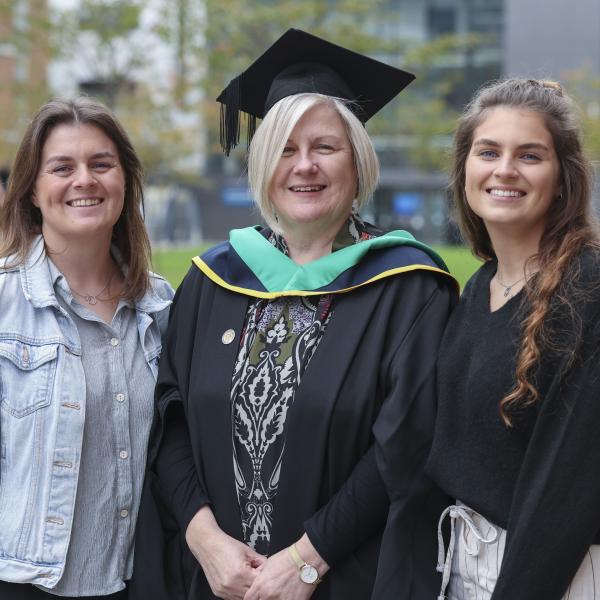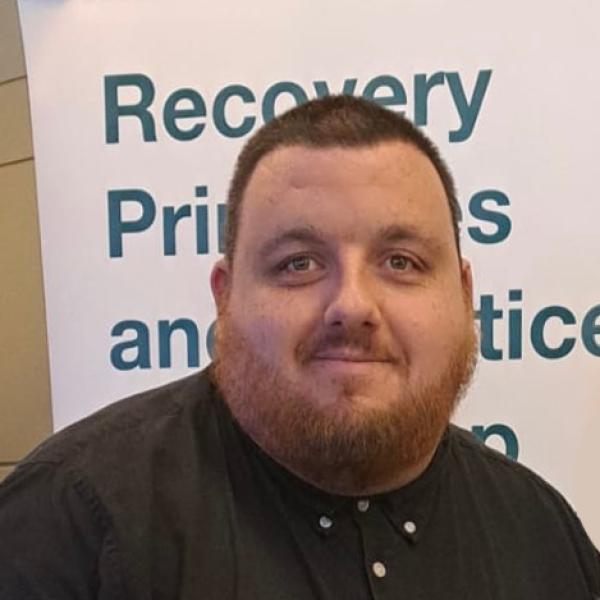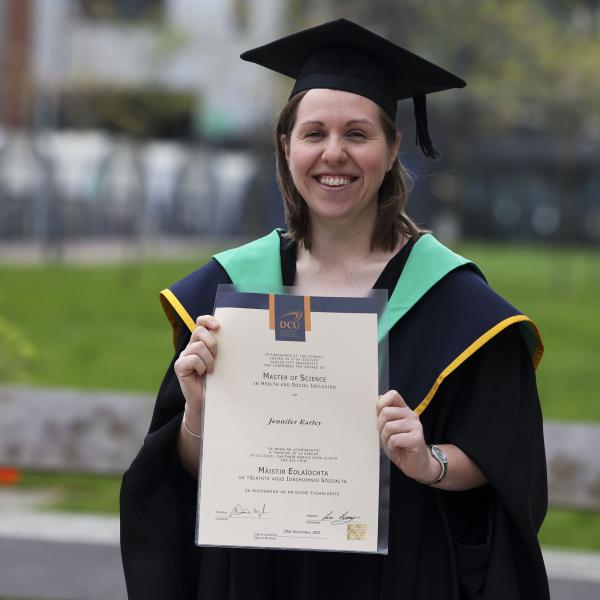Overview
Our two-year programme, the first of its kind in Ireland, is designed to give you the knowledge and skills you will need to tackle healthcare inequity and social exclusion, which can devastate community health and social wellbeing.
As Ireland’s population continues to change, we need to promote inclusion and protect our diverse communities. People are often marginalised due to poverty, ethnicity, addiction, gender identity, illness or disability, and are likely to face poorer health outcomes. You will examine inequities, and develop the knowledge and skillset to respond to them. You will also learn how to improve community health engagement and social wellbeing, and lead in the field.
During this highly practical programme, you will be encouraged to volunteer in the sector if you are not already working in it full-time. Most students come from a health or social care background, from psychiatric nurses to charity workers, so you will benefit from group discussion and hands-on learning involving varying disciplines and perspectives.
When you graduate, you will be sought after in a range of sectors including health and social care settings, health promotion, health-related statutory services, non-governmental organisations and policy making. Alternatively, you may choose to pursue further doctorate-level studies.
Further information for applicants who wish to apply for a Graduate Diploma in Health and Social Inclusion are available at this link.
Why DCU
DCU People

As someone who returned to college as a mature student, I knew I wanted to continue my education as soon as I finished my undergraduate degree.
Read more about Ethel Matarutse

“It was the best thing I ever did,” says Tracy McDaid of her decision to take the MSc in Health and Social Inclusion at DCU.
Read more about Tracy McDaid

Undertaking the MSc in Health and Social Inclusion has been a game changer for me both personally and professionally.
Read more about Michael Norton

Jenny Earley’s career path had taken some unexpected turns before she found herself taking on DCU’s MSc in Health and Social Inclusion.
Read more about Jenny Earley
Careers & Further Options
Careers
The programme’s graduates will enjoy employment in a range of sectors including health and social care settings, health promotion, health-related statutory services, non-governmental organisations, academic sectors and/or pursue further doctorate-level studies.
"DCU graduates are highly sought after by employers. Our Graduates work in environments ranging from large multinationals to SMEs, family businesses and start-ups across every sector.
DCU Careers Service has a number of learning and development initiatives in place for our students, giving them the skills they need for a successful career path."
Entry Requirements
Applicants will typically hold a (NFQ) Level 8 Honours Degree with a H2.1 or equivalent in a relevant discipline, for example: nursing, medicine, psychology, social work, public/community health; health and society; addiction studies, nutrition and dietetics or cognate discipline.
Recognition of Prior Learning (RPL) applicants are required to submit a cover letter along with their application under the Transcripts section of the portal, affirming their intent to apply for RPL. For more information on RPL see here.
Prior learning may be formal accredited learning or experiential/uncertified learning which includes the knowledge, skills and personal qualities acquired through life, work experience and study which are not formally attested. Prospective students may apply through the RPL route if they meet one or more of the following entry requirements:
- Relevant learning, qualifications and experience within their RPL application
- Holding a position or role related to health or social care, health and social inclusion promotion, or a related area
- Holding an appointment or professional position in the domain
- Professional qualifications in the domain, with clear articulation of intention to progress to work in the domain.
Programme Structure
The core curriculum of this programme, delivered by an interdisciplinary group of experts, gives students the knowledge, skillsets and experiences required to understand and influence health and social inclusion in Ireland and abroad.
Topic areas include:
- Frameworks and strategies for tackling health inequities and social exclusion
- Leadership, management and innovation in health and social care practice
- Health promotion for marginalised populations
- Research methods and programme evaluation
Many of our students are based in healthcare or social support services and wish to develop professionally within their chosen practice area. Others may want to pursue academic, research or policy development careers.
This programme offers students a choice of undertaking a research dissertation or a practice development project, allowing students to tailor the programme for their chosen career path.
This two-year, part-time programme is delivered in a flexible, blended-learning format using a mix of face-to-face, online learning activities and learning in the practice context (if appropriate).
Our small cohorts make it possible for local and international mentoring from faculty and practice supervisors who have a wide range of expertise in the promotion of health and social inclusion.
Time commitment:
|
Online/blended/in-person: |
Blended |
|
Day/evening/weekend: |
Evening |
|
Number of days on campus per week: |
6 core days per Semester with additional days depending on optional module selection |
|
Typical days(s) of week on campus: |
Thursday, Friday |
|
Typical hours per day on campus: |
6 |
|
Independent learning time - hours per week: |
12 |
|
Additional information: |
Blended course: Year 1 includes 6 core days on campus per semester combined with online teaching on two evenings per week. Additional days may be required in year 1 depending on optional module selection. Year 2 includes 2 days on campus per semester |
Please note this information is indicative only and subject to change.
Fees and Funding
Fees
How To Apply
All Applicants must apply through DCU's Student Application Portal which is available here. Here's a quick step by step guide if you need help with your application.
Under academic structure, please select the 'Post Graduate Taught" option.
Alongside the supplementary documentation required candidates must also provide the following as part of their application on the Student Application Portal:
- Provide Academic Transcripts for each and every year of study with English translation if applicable.
- If applicable, provide evidence of competence in the English language as per DCU entry requirements. Please see link http://www.dcu.ie/registry/english.shtml.
Application Deadlines
Applications will be accepted on a rolling basis until the programme is full or until:
- Closing date for Non EU applicants is 1st July 2025.
- Closing date for EU applicants is 30th August 2025.
Note: Non-EU applicants who require a study visa for the purposes of studying at DCU are not eligible to apply for this part-time programme as study visas are only granted for full time programmes.
All entry requirements should be met before the commencement of the programme.
Application Queries
For EU applicant queries, please visit https://www.dcu.ie/registry/eu-postgraduate-taught-admissions or email postgraduateadmissions@dcu.ie
For non EU applicant queries, please visit https://www.dcu.ie/registry/international-admissions-undergraduate-and-postgraduate or email internationaladmissions@dcu.ie
Commencement of Programme
The programme commences in September 2025.
Life On Campus
At DCU, our students can expect a unique campus experience. We are known for our excellent teaching and learning facilities, our active clubs and societies, and our great social and sporting facilities. All this makes DCU an exciting place to be.
DCU has three academic campuses; Glasnevin, St. Patrick’s and All Hallows (both in Drumcondra), all close to Dublin City centre.
They can be reached by public transport, Dublin Bus and Bus Éireann, with our Drumcondra campuses a ten minute walk from Drumcondra Train Station. Glasnevin is a 20 minute walk from St Patrick’s and All Hallows. They are also linked by Dublin Bus.
Each campus has a library (O’Reilly, Cregan and Woodlock Hall), study spaces, restaurants, and on-campus residencies. There are sports facilities on Glasnevin and St. Patrick’s, and there is a dedicated sports campus, St Claire’s, located near Glasnevin on the Ballymun Road.
DCU’s 19,000 students have access to exceptional teaching and learning facilities across our three academic campuses.
These include modern learning theatres, research centres, a new media and TV studio, radio/podcast studios, computer suites and advanced labs in the areas of Languages, Engineering, Physics, Chemistry and Biotechnology, as well as a Sports Performance centre and a training hospital ward. In 2021, we opened our first virtual reality ‘Leadership Lab’, which is located in our Business School.
We continue to improve and update our facilities. For example, construction of a new world-class STEM facility is underway on the Glasnevin campus. With capacity for an extra 3,000 STEM students, this facility will advance DCU’s international reputation for excellence in science and health, computing and engineering disciplines.
Studying in DCU isn’t just about course work. The university is rich in student life and activities.
There are more than 140 clubs and societies for students in DCU, with ‘Clubs & Socs’ days taking place on both the Glasnevin and Drumcondra campuses at the start of the academic year. They span everything from rugby to rock climbing, anime to jazz.
For many students, sport is an important part of the DCU experience. DCU’s Sports Complex boasts a 25 metre swimming pool, fitness centre gym, all-weather pitches and squash courts, as well as soccer, GAA and rugby pitches. DCU Dóchas Éireann, the university’s GAA club, is the largest third level Gaelic Games club in the country. Meanwhile, DCU Athletics has been Ireland’s highest achieving university club for many years. And DCU has dozens of other clubs to get involved in, from Archery to Weightlifting.
The Glasnevin campus is home to our purpose built, state-of-the-art student centre, The U, which serves the needs of a rapidly growing student body. Here, you will find the Student Leadership and Lifeskills Centre, performing arts and cultural spaces for students and the wider community, and the Entrepreneurship and Innovation Hub. Also located on our Glasnevin campus is The Helix, our renowned performing arts centre.
On our St Patrick’s campus, we have the Java Student Hub, a vibrant, warm and welcoming space where students can meet for coffee, play music, use the projector to watch events, or just relax. The walls of the Java Hub were designed based on the cultural history of St Patrick’s Campus, including the special references to the notable sporting history and history of the arts.
We have a number of academic, professional and social supports for students.
Student Advice & Learning Skills Centre - Offers a wide range of supports and services to students and advice
The Writing Centre - drop-in writing workshops for students through the academic year
Maths Learning Centre - provides maths support for students of all ability levels with maths modules
Student Learning - facilitate the transition from passive to active learning for students at DCU, by teaching study skills, nurturing critical thinking and building student confidence.
Careers work with students to help them on their professional journey into graduate employment.
Our student support team offers a comprehensive support programme, helping students make that all important transition into university life and focusing on building confidence and skills which are key to success at third level.

DCU Glasnevin Campus
FAQs
Is DCU all one campus?
DCU is a multi campus university - the Glasnevin, St Patrick's and All Hallows campuses. The St Patrick's campus is where the Education courses are taught and some of the subjects from the BA Joint Honours degree. There is a 20-25 minute walk between the campuses but there are buses and bikes available to go between them also.
Click here to see maps of all of our campuses
If I'm studying on the St Patrick's campus, can I use the library and sports centre on the Glasnevin campus?
Yes, all facilities such as sports and accommodation are open for all DCU students to avail of.
Are there libraries in DCU and if they have wifi and work stations?
We have a brand new state of the art four floor library on our St. Patrick's Campus which complements the existing library on the Glasnevin campus. There is free wifi, work stations as well as desktop computers.
Does DCU provide accommodation?
DCU does have on-campus accommodation for undergraduate and postgraduate students, and you can find out more and apply via the Accommodation Office webpage.








